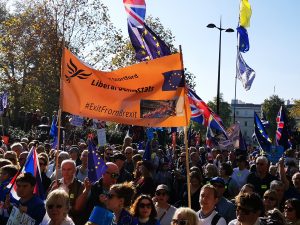
The preamble to the Liberal Democrat constitution is a good place to start — we “exist to build and safeguard a fair, free and open society, in which we seek to balance the fundamental values of liberty, equality and community, and in which no one shall be enslaved by poverty, ignorance or conformity”.
This is not about a narrowly party-political agenda. It is about embracing the bright future on offer to a Britain at the heart of the EU, which we are in danger of failing to grasp, but gets in touch with the vision that took us in and has enabled us to make a real contribution — not least to bringing about the Single Market.
Putting some flesh on those bones, in no particular order:
- Improve Benefits. Universal Credit could have been a good idea,eorge Osborne’s decision to cut £3.2Bn from its funding in his first post-coalition budget has hit it hard and people are suffering. Improving the funding is a good place to start. We also need to go further. It is a scandal to have people needing to use food banks or losing the roof over their head because of the way the system works. I’ve spoken with people struggling to live on benefits, who voted Leave in the desperate hope that things would improve. It’s time we encouraged people to see benefits as there to help those who need them, not as a punishment for those who are suffering.
- Wealth inequality. Back in the autumn, Vince Cable put forward a raft of tax reforms to make the system fairer, especially around inheritance and investment income and pensions. The Univeral Basic Income has been on the edge of discussions for a long time. It is time to take it seriously — it can’t be done overnight, but it is time to start the conversation as a way to pick up where we are, and fears around the way in which technology is reshaping the world.
- Brexit has pushed climate change from the top of the agenda. People have every reason to be worried. That means is that it is high time to turn that worry into action — around renewable energy, carbon capture and storage, nuclear power, zero carbon housing, improved public transport, and more.
- The Blair government had some good ideas on devolution, with elected regional assemblies and pulling government offices and development to the same boundaries. The imbalances around devolution to Wales, Northern Ireland and particularly to Scotland would look very different if there was meaningful devolution in England. It may not be a coincidence that Dominic Cummings (of Vote Leave fame) was also very involved in engineering the referendum that defeated the creation of an elected assembly in the North East — resentment of “London” that fueled the Leave vote there might well have been rather less if people had been used to power being much more local.
- It’s time to talk openly about federalism. Too often it’s a dirty word in British (or at least, English) politics. It’s time to dispatch the myth that it is about centralising power and put the case for doing centrally only what needs to be done there and pushing decisions as close as possible to the people they affect. That applies as much to devolving power from Westminster as it does devolving it from Brussels. It exposes the present Tory attempts at “devolution” as the sham they are.
- It’s time to be celebrating diversity, the opportunities coming from free movement of people and the economic benefits of immigration, so we go from the fantasy of immigrants “taking our jobs” to the reality of what we gain from immigration — beginning with the reality that the Tories keep missing their immigration targets because you can’t cut immigration without hurting the economy.
- Celebrate being being European, with our shared heritage, history and values. It also means celebrating the vision behind the EU. That’s both about drawing on the richness of our story and recognising, and holding in check, our capacity to harm each other.
- Education and life-long learning are the real responses for people who experience globalisation as a threat to their livelihood. There are things for the state to do directly, and things to enable the private sector so that the changes going on bring opportunity and possibility for people.
- Too many people live in places where their votes don’t count. Many felt that the 2016 referendum was a rare chance for their vote to make a difference. The message has to be that people count. Their votes must count. This means voting reform. This isn’t about a smaller party seeking greater influence, or electoral geekery. It is about enabling all voices to be heard.
How we do voting reform or constitutional reform (including House of Lords Reform), what else we do to tackle wealth inequality and to celebrate diversity, are things for discussion rather than for one party to impose. But there is a raft of Liberal Democrat policy that is relevant to healing the divisions behind and exposed by the 2016 result and commitment to “the values of liberty, equality and community” is a brilliant starting point for the task of working together to build a bright, European future.